In the Minneapolis Star-Tribune, cycle shop owner Mike Larson explains how CPSIA’s irrationality actually increases risk: “Kids aren’t licking or eating their ATVs, but they just might ride adult-sized ATVs thanks to this ban. Congress is putting kids in danger by refusing to address this problem.”
Posts Tagged ‘CPSIA and minibikes’
House hearing on CPSIA Thursday
Speaker line-up via Rick Woldenberg; opening statements by Reps. Mary Bono Mack (R-Calif.) and Fred Upton (R-Mich.); ABC News coverage; Republicans reportedly preparing legislation that would amend, but not repeal, the ill-conceived statute; a move to strip funding for the controversial product database.
A separate piece of legislation may address the law’s devastating effects on the sale of youth motorcycles, snowmobiles and all-terrain vehicles:
“The original legislation Congress passed was meant to keep kids safe from lead content in toys,” said Rep. Denny Rehberg (R-MT), who comes from a state where smaller recreational vehicles are popular. “Ironically, the overreaching enforcement wound up putting kids at risk by forcing them to use larger more dangerous machines that are intended only for adults.”
Rehberg’s “Kids Just Want to Ride” Act, which he introduced last month, has 41 co-sponsors, including seven Democrats. A similar bill in the last Congress garnered 70 co-sponsors, including 24 Democrats.
Counting our blessings dept.: bills Congress didn’t pass
Carter at Point of Law compiles a list of mostly-bad bills Congress left town without passing [parts one and two] One very worrisome law of this sort, the we-sue-the-world Foreign Manufacturers Legal Accountability Act (FMLAA), is the subject of a new policy analysis by my Cato Institute colleagues Daniel Griswold and Sallie James (it’s the sort of aggressive trade restriction that could touch off major retaliation, not to mention its possible CPSIA-like effects on vintage dirtbike collectors; more background here, here, and here).
Unfortunately, two troublesome enactments — the food safety bill and the misnamed Paycheck Fairness Act — were teed up by Majority Leader Harry Reid for possible expedited passage in the lame duck session.
New campaign to overturn CPSIA dirtbike ban
The Motorcycle Industry Council feels momentum is now on its side in its effort to re-legalize youth motorcycles and all-terrain vehicles, which flunk CPSIA’s ban on lead-containing alloys. [MotorcycleUSA.com] More background here and here.
CPSIA chronicles, June 18

- As noted earlier, the next all-out debacle on the CPSIA front is expected to result from the law’s tracking and labeling regulations, due to take effect August 14, and for which the CPSC has not yet issued guidance, although product makers ordinarily need to resolve crucial issues of manufacturing (as with etching of lot numbers) and packaging at least many months if not longer in advance of sale. Sharon McLoone at CNNMoney had quite a good report a week ago on this latest crisis, which as of this writing has not been followed up much of anywhere else in the press. This continues the pattern in which 1) most key elements of the ongoing CPSIA disaster get good coverage in at least one (sometimes more) major media outlets; 2) the bigger-picture disaster of the law never quite succeeds in breaking out into general coverage as a national story, in large part because 3) the agenda-setting New York Times never consents (even six months into the story!) to give the matter any coverage at all. For more hints on the approaching tracking-label train wreck, see this op-ed by a South Carolina maker of school supplies (“Companies such as ours are now forced to guess about their new legal requirements. … My company may have to change labels hundreds of times a week in our two factories. The investment necessary to handle this new rule alone is crippling.”), or the comments of appliquéd bib maker Laurel Schreiber of Lucy’s Pocket (if the testing doesn’t get her, the tracking labels will), or of New Jersey wooden toy maker John Greco (advised that tracking info would add $3.50 to $5.00 to cost of making $10 handmade toy). And here’s a view from the home furnishings business.
- No, the menace to pre-1985 children’s books has not gone away, not in the least. Librarians and publishers remain on the edge of their seats awaiting exemptions, clarifications or both. There was some good coverage last month in the Sioux Falls Business Journal (store owner Jenny Cook “had to throw out only 30 books at her store to comply” because most were newer; “Siouxland Libraries has pulled a list of books that were published before 1985”) and at Syracuse.com (“When you think through the implications, it means closing our libraries to children”). And in a sign of possible things to come, ABC-affiliated stations in Seattle and Washington, D.C. have now run sensationalist “toxic books!” attacks on local libraries [Common Room, ShopFloor] More: Winifred Maker, Anderson Valley Post (April).
- The CPSC’s stay of enforcement didn’t really solve the problem of the ban on dirtbikes and mini-ATVs, and responsible users and dealers end up getting the short end of the stick [Jason Giacchino/ATVSource, Vince Castellanos/ESPN FMX, Motorcycle Industry Council, Charleston (S.C.) Post and Courier]
- Downtown Los Angeles is home to an estimated 500 toy companies — most of them far smaller than crosstown giant Mattel — and they’re in much distress from the law. [Alexa Hyland, L.A. Business Journal] The L.A. Times, which once gave serious scrutiny to the law’s effects on the apparel and resale sectors, seems (scroll) to be dropping the ball.
- Those who remain in the kids’-product business after coping with all the other parts of the law will also want to educate themselves about “recall escrows” [Rick Woldenberg]
- Inez Tenenbaum, named by Obama as new CPSC chair, had her confirmation hearing on Tuesday [ShopFloor and more, Rick Woldenberg]. Nancy Nord earlier stepped down from her role as acting chair.
- What, what, what could they have been thinking? The American Library Association has actually given its 2009 Public Service Award to California Senator Barbara Boxer, a key architect of some of CPSIA’s provisions; the retroactive phthalates ban she championed has been especially effective in forcing “books-plus” off library shelves, and she has turned a coldly unsympathetic ear to cries of distress over the law (via @melanes). To repeat: what could the ALA have been thinking?
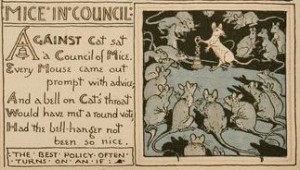
Public domain images courtesy ChildrensLibrary.org: Walter Crane, illustrator, The Baby’s Aesop (1887).
Bicycle smashup, of the regulatory sort
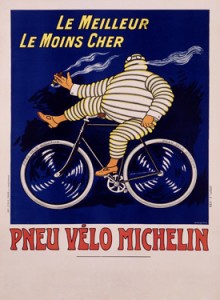 The Bicycle Product Suppliers Association has played a role (PDF) in the fight against CPSIA’s (presumably inadvertent) ban on kids’ bicycles; it’s also been dealing with a controversy in the New Jersey legislature over a proposed ban on quick release wheels. But now the legal bills are coming due: “In fact, the expenses associated with these issues could ultimately surpass the association’s entire annual budget of approximately $100,000,” said BPSA president John Nedeau [Bicycle Retailer].
The Bicycle Product Suppliers Association has played a role (PDF) in the fight against CPSIA’s (presumably inadvertent) ban on kids’ bicycles; it’s also been dealing with a controversy in the New Jersey legislature over a proposed ban on quick release wheels. But now the legal bills are coming due: “In fact, the expenses associated with these issues could ultimately surpass the association’s entire annual budget of approximately $100,000,” said BPSA president John Nedeau [Bicycle Retailer].
CPSIA chronicles, May 15
Plenty of news in recent days: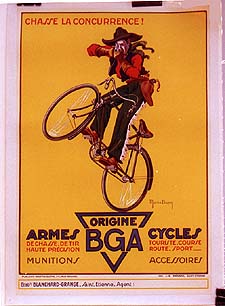
- Ordinary bicycles have now joined youth motorbikes and ATVs in the twilight status of not-quite-legal temporary toleration. That’s the impact of a unanimous (2-0) vote (PDF) by the Consumer Product Safety Commission granting the conventional bicycle industry a two-year stay but not exemption from CPSIA’s lead limits (earlier). Since everyday bikes unavoidably contain some lead that is potentially absorbable (if at infinitesimal levels), they are not legal, exactly, but the Commission promises not to go after anyone for selling them, for now. CPSC acting chair Nancy Nord:
We are compelled to deny the petition because the language of the statute does not give us the flexibility to do otherwise, even though our staff does not believe that lead exposure from using bicycles and related products presents a risk that they would recommend the Commission regulate. The risk assessment methods traditionally used by the Commission in evaluating exposure to lead are no longer available to us under the CPSIA.
Nevertheless, we also recognize, as we did when presented with a similar petition filed by the All Terrain Vehicle industry, that safety requires the presence of some lead in the metal used in the product to insure structural integrity. I am also mindful of the staff’s findings that the contact children may have with the parts of the products that contain lead is not extensive and would not present a risk as we have traditionally understood the term—that is, would not increase blood lead levels in any measurable way. Presented with the dilemma of inflexibility in the law vs the need for regulatory action that recognizes safety and good sense considerations, we are opting to stay enforcement.
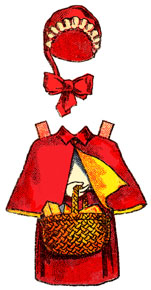
This course of action is becoming all too frequent for the CPSC. It is needed to avoid market disruptions and to protect consumers. However, it is not the optimal way to implement a statute. - On the other hand — and with potentially catastrophic consequences for businesses large and small — the commission by a 1-1 vote (Nord in favor, Thomas Moore against) turned down a stay (PDF) of the tracking label requirements due for August (earlier here and here). Much coverage at NAM ShopFloor, here (decisions on packaging, whether to etch numbers into products, etc. must be made with much lead time and manufacturers now face staggering costs if they guess wrong), as well as here, here, and here.
- Yesterday the House Small Business Committee held its long-awaited hearings, the first in either chamber since CPSIA took effect, on the law’s calamitous impacts on business. I haven’t had a chance to watch yet, but the House Small Business majority (Democratic) side has put up videos. The impression one gets from reform blogs is that 1) the hearing itself was pretty good but that 2) committee leadership then proceeded to ignore much of what was actually said and rally behind the Waxman line that there’s nothing wrong with the law itself, it’s just that the CPSC leadership hasn’t implemented it properly. [Carter Wood, Rick Woldenberg, Woldenberg’s submitted statement]
- Chalkydoodles has a two-part interview with founder Cecilia Leibovitz of the Handmade Toy Alliance: part I, part II (via ExUrbanis);
- CMMJaime takes a look at the CPSC’s new handbook for resellers, and finds its reassurances for small businesses subjective and vague, particularly when it comes to lines like: “Use your best judgment based on your knowledge of the product”.
- “Toy importer Rob Wilson’s company sometimes sells wooden children’s puzzles, but he hasn’t ordered one since last November.” That’s from the Metro-West Daily News in suburban Boston, which also has this ominous political bit:
McGovern [Rep. James McGovern, D-Mass.] said the federal agency is not being onerous, and businesses should work with it to resolve their worries.
In a written statement, Sen. John Kerry’s office said the measure is meant to keep dangerous products off the shelves, and it needs a chance to work before it is changed.
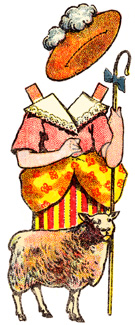
Public domain paper doll images courtesy Karen’s Whimsy.
CPSIA chronicles, April 24

- Understatement alert: per the official Congressional Research Service on Capitol Hill, “For the moment…one thing seems certain: implementation of the CPSIA is not going well.” [report in PDF format courtesy ShopFloor]
- In Wisconsin, the Madison Children’s Museum has for the past 21 years based its annual fundraiser (July 18, this year) on a big discount sale of American Girl dolls and accessories. Worse luck for them.
- “Anti-recycling”, maybe? Is there a word for what happens when you yank perfectly safe, useful products off shelves by the ton and send them instead to landfills?
- Blast from the past dept.: if you think Public Citizen has made a mess of the risk and science issues in its advocacy on behalf of CPSIA, you should check out the world-class mess it made when it enlisted in the trial lawyer campaign against silicone breast implants, to name but such one campaign of many.
- Powersports dealers wary of whether new stay of enforcement really protects them [DealerNews, Sioux City (Iowa) Journal]
- The first senior, influential Senate Democrat to acknowledge that CPSIA needs fixing? Montana’s Max Baucus is willing at least to sign on to a legalize-minibikes bill.
- In the comments section on NPR’s phthalates story earlier this month, one of the most-recommended comments was that by Steven Tesney of Houston, who wrote, “As a result of CPSIA and the surrounding political grandstanding, my small home-based company will be going out of business. I design clothing for ‘Alternative’ families with infants, toddlers & kids. My products are organic and use natural dyes but because of new testing requirements that are completely cost prohibitive, I will be forced – along with hundreds of thousands of crafters, artisans and other small business owners – to close my doors. The only companies that will be able to afford the testing will be large corporations (many from China). Mass produced goods win while homemade, handcrafted goods lose. Say goodbye to the charming hand carved wooden toys & crocheted baby caps that you take to baby showers. Say hello to a plethora of licensed products staring back at your children.”
- “CPSIA and the black market” [Wacky Hermit]
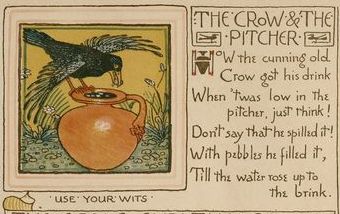
Public domain image courtesy ChildrensLibrary.org: Walter Crane, illustrator, The Baby’s Aesop (1887)
CPSIA won’t let us build a legal bicycle
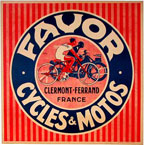 But we shouldn’t let the bike dealers get panicked or anything. Earlier here and here.
But we shouldn’t let the bike dealers get panicked or anything. Earlier here and here.
CPSIA & dirtbikes: temporary stay, no permanent relief
It’s going to take an act of Congress to bring dirtbikes, kid-size ATVs and similar motorized vehicles back into the legal sunlight. In the mean time, though, the CPSC has consented to let them venture back out into a half-legal and temporary twilight. That’s the upshot of the commission’s new pair of decisions, in which it’s 1) granting a temporary stay of enforcement on the vehicles, just as in February it granted such a temporary stay with respect to some of CPSIA’s most impractical testing obligations for manufacturers, while 2) refusing to accord the recreational vehicles an actual exemption from the law. Because of the latter refusal, sale and service of the vehicles will continue to be in violation of the law’s terms, and dealers and families will have to hope that the 50 state attorneys general agree to follow the federal agency’s lead in forbearing from enforcing the law for the time being. [Motorcycle Industry Council; StopTheBanNow.com; documents at “What’s New” section of agency site]

Why this unsatisfactory half-relief, in the face of a continuing uproar against the ban? Acting chair Nancy Nord has said she believes a permanent exemption to be inconsistent with CPSIA’s terms, which forbid such exemptions unless manufacturers can proffer a scientific demonstration that leaving a class of products on the market will not result in “any” lead absorption or other public health risk. Her co-commissioner Thomas Moore, while as usual distancing himself from Nord and from critics of the law, reached the same conclusion, agreeing that the ban was risking safety problems by causing kids to get on bikes too large for them. [Washington Post] According to Rick Woldenberg, the industry submitted evidence that the lead exposure a child would experience from riding an ATV for between two and seven weeks would approximate the amount of naturally occurring lead in one (1) Coffee Nip candy (a perfectly legal confection). But “so infinitesimal as not to worry about” is not the same thing as “not any”, and no such legal distinction was recognized by the drafters of CPSIA, for whom the maxim “the dose makes the poison” would appear as mysterious as if written in, well, some sixteenth-century German book.
More on the political maneuvering and protests over the industry’s pleas for relief: KneeSlider, CycleTrader, ShopFloor (and more there). On protests, see RacerX Online, CALA (on Malcolm Smith protest). Missouri legislator Tom Self made a 10-day tour to Illinois, Indiana and Kentucky on behalf of lifting the ban [Covenant Zone]. No word on whether an April 23 protest rally set for Denver will go forward as scheduled.
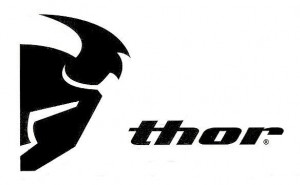
Congress, of course, must act. Apropos of which, Covenant Zone has some further thoughts with which to close:
A sign of immaturity in children is when they fail to see the consequences of their actions; without a belief in the value of seeing the big picture, they would constantly snack on chocolate bars and coca-cola instead of fruits, vegetables and juice, they would stay up “past their bedtime” at the expense of a good night’s sleep and being refreshed for the next day, they would simply jump on a motorbike and ride instead of summoning the discipline to first learn about safety and maintenance, as well as the honesty required in understanding how to ride within one’s limits.
Sometimes I get the impression that the average kid who spends time in the great outdoors has more maturity, common sense and appreciation for the broad horizon of life’s Big Picture than does the average members of Congress, who don’t even read the bills they sign into law.
